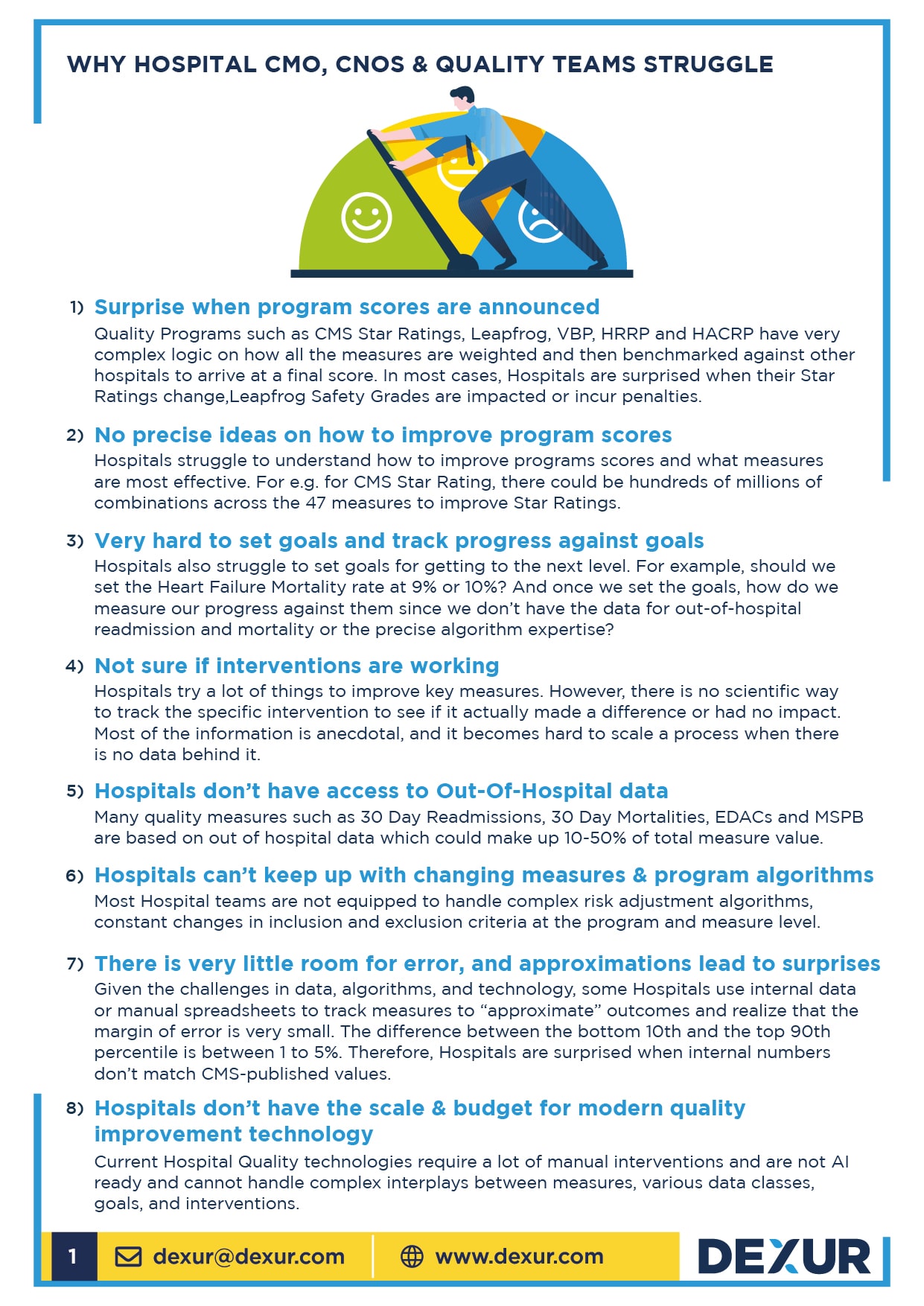8 Reasons Hospital CMOs, CNO & Quality Teams Struggle to Manage CMS Star Ratings, Leapfrog, HRRP, VBP, HACRP and Other Quality Programs
Get Dexur’s Personalized Hospital Specific Presentation on Quality, Safety, Compliance & Education
1) Surprise when program scores are announced
Quality Programs such as CMS Star Ratings, Leapfrog, VBP, HRRP and HACRP have very complex logic on how all the measures are weighted and then benchmarked against other hospitals to arrive at a final score. In most cases, Hospitals are surprised when their Star Ratings change, Leapfrog Safety Grades are impacted or incur penalties.
How Dexur Helps:
Dexur offers Predictions and Guidances for all the major quality programs and has had a 98% accuracy rate in predicting the final CMS Star Rating.
2) No precise ideas on how to improve program scores
Hospitals struggle to understand how to improve program scores and what measures are most effective. For e.g. for CMS Star Rating, there could be hundreds of millions of combinations across the 45 measures to improve Star Ratings.
How Dexur Helps:
Dexur offers AI Driven Simulations that crunches through hundreds of millions of combinations to give you the optimal path to improving your scores. Moreover, these simulations are performed across major quality programs so the improvement in one measure (e.g. CLABSI) can be simulated across programs E.g. Leapfrog and CMS Star Rating.
3) Very hard to set goals and track progress against goals
Hospitals also struggle to set goals for getting to the next level. For example, should we set the Heart Failure Mortality rate at 9% or 10%? And once we set the goals, how do we measure our progress against them since we don’t have the data for out-of-hospital readmission and mortality or the precise algorithm expertise?
How Dexur Helps:
Dexur offers goal setting and tracking software to measure against targets and simulations.
4) Not sure if interventions are working
Hospitals try a lot of things to improve key measures. However, there is no scientific way to track the specific intervention to see if it actually made a difference or had no impact. Most of the information is anecdotal, and it becomes hard to scale a process when there is no data behind it.
How Dexur Helps:
Dexur offers Evidence Based Quality Management software Interventions and Actions can be tracked to see what impact it has on each measure.
5) Hospitals don’t have access to Out-Of-Hospital data
Many quality measures such as 30 Day Readmissions, 30 Day Mortalities, EDACs and MSPB are based on out of hospital data which could make up 10-50% of total measure value. Dexur has published several articles on the impact and challenges of Out of Hospital Data. See these articles for reference:
-
Nearly 30% of Readmissions are to a Different Hospital From the Index Stay
-
Nearly 60% of Deaths for CMS Mortality Measures Happen Outside the Index Stay
How Dexur Helps:
Dexur is an approved purchaser of Medicare claims data and therefore can provide insight across the patient journey. These are the same claims that CMS uses for its claims based quality measure.
6) Hospitals can’t keep up with changing measures & program algorithms
Most Hospital teams are not equipped to handle complex risk adjustment algorithms, constant changes in inclusion and exclusion criteria at the program and measure level.
How Dexur Helps:
Dexur’s entire organization across healthcare quality team members, statisticians and software engineers are focused on keeping up to date with the latest measure algorithm updates. These constantly updated algorithms are shared through our data and software to our customers.
7)There is very little room for error, and approximations lead to surprises
Given the challenges in data, algorithms, and technology, some Hospitals use internal data or manual spreadsheets to track measures to “approximate” outcomes and later come to realize that the margin of error is very small. The difference between the bottom 10th and the top 90th percentile is between 1 to 5% (see details of this article for reference). Therefore, Hospitals are surprised when internal numbers don’t match CMS-published values.
How Dexur Helps:
Dexur’s Scorecards, Measures and Data Classes solutions are geared towards precision across the quality management life cycle including predicting the future, simulations on what needs to be improved, goal setting and evidence based quality management.
8) Hospitals don’t have the scale & budget for modern quality improvement technology
Current Hospital Quality technologies require a lot of manual interventions and are not AI ready and cannot handle complex interplays between measures, various data classes, goals, and interventions.
How Dexur Helps:
Dexur has modern AI driven technology to manage quality across the lifecycle. Dexur’s AI Solutions include:
-
AI Quality Advisor to augment your quality teams in showing automated insights in improving your quality.
-
AI Simulations to automatically suggest the best path to improve your scores
